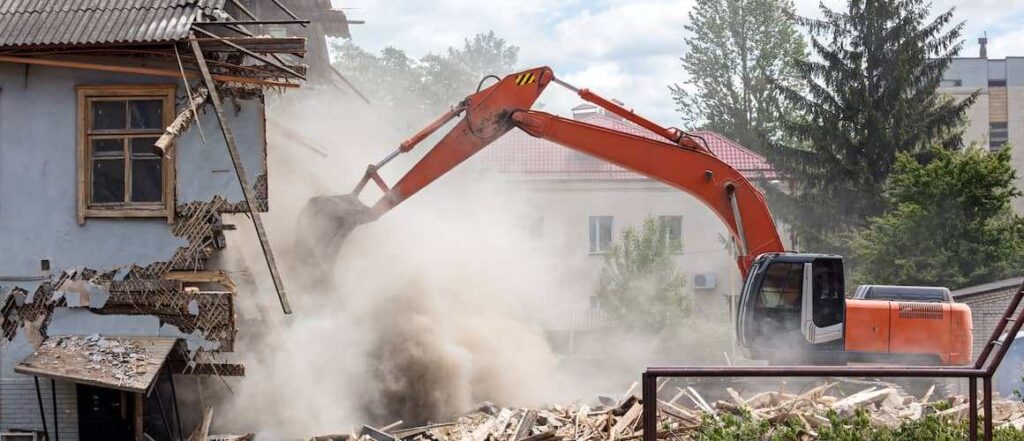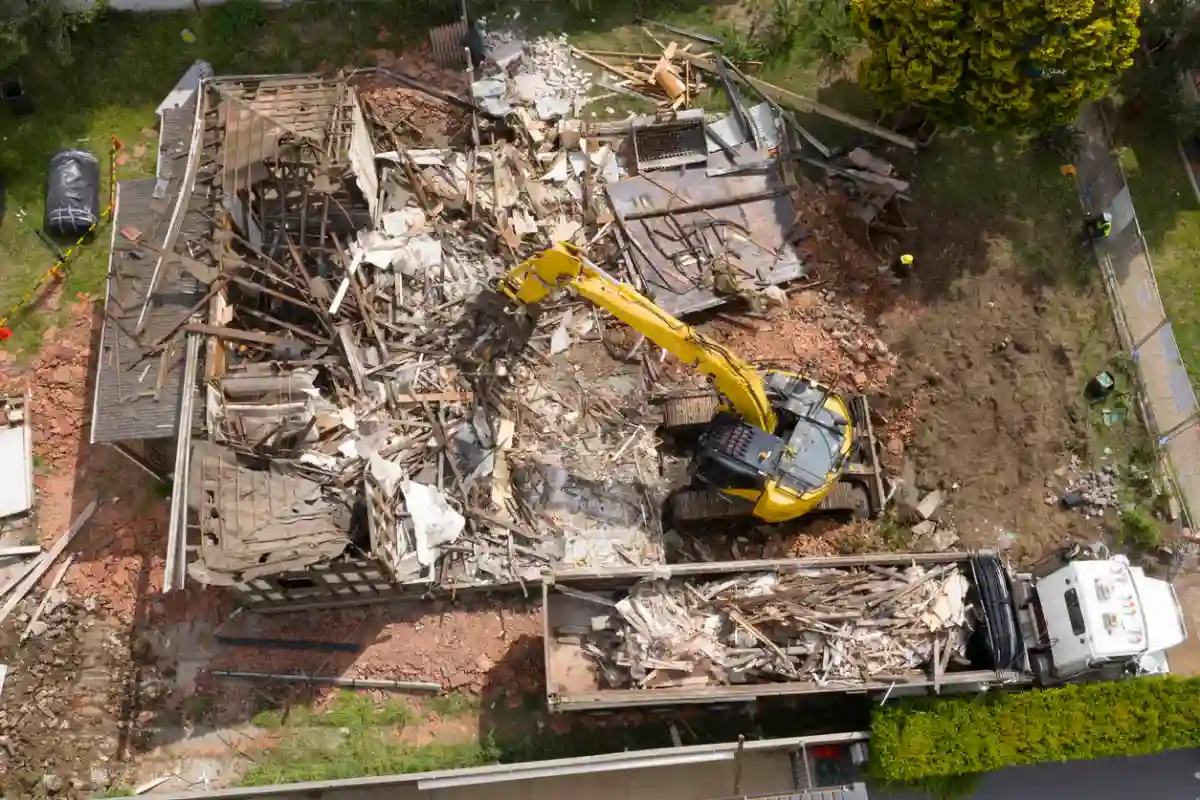Tearing down a house can be a necessary step in real estate development, whether it’s due to the desire to build something new in its place, a property becoming unsafe or uninhabitable, or other reasons. In Michigan, as in other states, the cost of demolishing a house can vary based on a variety of factors such as location, size, materials, and additional services needed. In this blog post, A&B Junk delves to the various aspects that influence the cost of tearing down a house in Michigan, providing homeowners and developers with a comprehensive guide to understanding the process and its associated costs.
Factors Influencing Demolition Costs
Several factors play a role in determining the overall cost of demolishing a house in Michigan. These include the size of the house, the materials used in its construction, and its accessibility. Additionally, the presence of hazardous materials, such as asbestos, can significantly increase the cost. The complexity of the demolition, such as whether the house has a basement, whether there are trees or other structures that need to be removed, and the distance to disposal sites, can also affect the price.
Demolition costs are influenced by several factors. The size and type of structure play a significant role; larger and more complex buildings generally require more resources and time. The location also matters, as urban areas may have higher costs due to access challenges and permit requirements. Hazardous materials, like asbestos, can increase expenses due to specialized handling. Equipment and labor costs fluctuate with market conditions. Additionally, waste disposal fees and recycling opportunities impact costs. Site preparation and clean-up contribute to the overall expense.
Size of the House

The size of the house is one of the most significant factors in determining demolition costs. Larger houses generally cost more to tear down due to the increased amount of work involved. The size is usually measured in square footage, and costs are often calculated on a per-square-foot basis. For example, a small bungalow of around 1,000 square feet will cost less to demolish than a two-story house of 3,000 square feet.
Type of Construction Materials
The materials used in the construction of a house can have a notable impact on the cost of demolition. Houses built with wood frames are generally easier and less expensive to tear down compared to those made of brick or concrete. These materials require specialized equipment and expertise to demolish safely, which can drive up costs. Additionally, the presence of materials such as stucco, stone, or metal can further complicate the demolition process and increase costs.
Construction materials encompass a range of substances used in building and infrastructure projects. Common types include concrete, steel, and wood, each offering specific benefits such as durability, strength, and versatility. Brick and stone are popular for their aesthetic appeal and long-lasting qualities, while glass and aluminum provide modern and sleek finishes. Sustainable materials like bamboo and recycled plastics are gaining popularity for eco-friendly construction.
When it comes to appliance removal services, the type of construction materials can influence disposal methods. Recyclable materials like metal and glass appliances can be efficiently processed, reducing waste and supporting environmental sustainability. Proper appliance removal also ensures safe handling and disposal of hazardous materials, aligning with modern construction practices.
Hazardous Materials
The presence of hazardous materials, such as asbestos or lead-based paint, can significantly increase the cost of tearing down a house in Michigan. Before demolition can begin, these hazardous materials must be properly identified and removed by certified professionals. This process can be time-consuming and expensive but is necessary to ensure the safety of workers and compliance with state regulations. Hazardous materials are substances that pose risks to human health and the environment due to their toxicity, flammability, or reactivity. Common examples include asbestos, lead paint, and certain chemicals used in industrial processes. These materials require careful handling, storage, and disposal to prevent harm.
Junk removal services play a crucial role in managing hazardous materials during property cleanouts or renovations. Professional junk removal companies are equipped to safely identify, handle, and dispose of hazardous materials according to local regulations. By employing trained personnel and appropriate equipment, these services help minimize exposure risks and ensure proper disposal, protecting both people and the environment.
Accessibility and Location
The location and accessibility of the house can also affect demolition costs. Houses located in densely populated urban areas may have higher costs due to limited access and the need for specialized equipment to work in tight spaces. Conversely, houses in rural areas may have lower costs, but the distance to disposal sites and the need to transport debris can add to the overall expense.
Disposal and Debris Removal
Proper disposal and removal of debris is an essential part of the demolition process. Michigan has regulations regarding the disposal of construction and demolition debris, and failure to comply with these regulations can result in fines or other penalties. Disposal costs can vary depending on the distance to the nearest disposal site and the volume of debris that needs to be removed. Recycling certain materials, such as wood or metal, can help offset some of the costs.
Disposal and debris removal are essential components of residential demolition services. These processes involve safely clearing away construction debris, including materials such as wood, concrete, metal, and other waste generated during the demolition of a residential structure. Efficient debris removal ensures the site is cleared and prepared for its next use, whether for new construction or landscaping.
Residential demolition services often include sorting debris for recycling or proper disposal, in compliance with local regulations and environmental standards. Proper disposal of hazardous materials, such as asbestos or lead, is critical for safety. By managing debris effectively, residential demolition services contribute to cleaner, safer communities and support sustainable practices.
Permits and Fees
Before tearing down a house in Michigan, homeowners or developers must obtain the necessary permits from their local municipality. The cost of permits can vary depending on the location and size of the house being demolished. Additionally, there may be fees associated with the inspection and disposal of hazardous materials. It is important to factor in these costs when estimating the overall expense of demolition. Permits and fees are essential for construction projects, including renovations and demolitions. Permits ensure compliance with local regulations, safety codes, and zoning laws. Obtaining permits can involve paying fees based on project size and scope. These fees contribute to municipal services like inspections and enforcement. Failure to secure necessary permits can result in fines, delays, and potential legal issues.
Labor Costs
Labor costs play a significant role in determining the overall cost of tearing down a house in Michigan. The complexity of the demolition, such as the need for specialized equipment or the presence of hazardous materials, can increase labor costs. Additionally, labor costs may vary depending on the experience and expertise of the demolition crew. It is important to work with a reputable and experienced demolition contractor to ensure the job is done safely and efficiently. Labor costs in construction projects include wages for skilled and unskilled workers, such as carpenters, electricians, and masons. These costs vary depending on the region, project complexity, and labor market demand. High labor costs can impact project budgets, making efficient resource allocation and skilled workforce management crucial for project success.
Cost Estimates
While it is difficult to provide an exact cost for tearing down a house in Michigan due to the various factors involved, a general estimate can be made based on industry averages. As of 2023, the average cost to tear down a house in Michigan ranges from $4 to $10 per square foot. This means that a 2,000-square-foot house could cost anywhere from $8,000 to $20,000 to demolish. However, this estimate does not include additional costs such as permits, disposal fees, or hazardous material removal.
Choosing a Demolition Contractor
Choosing the right demolition contractor is crucial to ensure a safe and efficient demolition process. It is important to work with a licensed and insured contractor who has experience with house demolitions in Michigan. Homeowners and developers should request quotes from multiple contractors and compare their services and prices. It is also advisable to check the contractor’s references and reviews to ensure they have a good track record.
Choosing a demolition contractor requires careful consideration to ensure a smooth and safe project. Look for contractors with experience and proper licensing in the type of demolition you need. A good contractor will have a track record of adhering to safety standards and local regulations. When linked with chairs removal service, a demolition contractor should offer efficient removal of furniture and other unwanted items before demolition begins. This ensures a clear workspace and reduces waste during the process. Verify that the contractor can handle proper disposal and recycling of materials for environmentally friendly results.
Environmental Considerations
Demolition can have environmental impacts, such as the release of dust and debris into the air and the generation of waste. Homeowners and developers should consider working with contractors who use environmentally friendly practices, such as recycling materials whenever possible and using dust control measures to minimize air pollution. Additionally, some areas may have specific regulations regarding the protection of nearby water sources or wildlife habitats.
FAQs
How much does it cost to demolish a house in Michigan?
House demolition costs $4 to $10 per square foot or up to $25 per square foot with asbestos or lead. The average cost to knock down or bulldoze a house is $6,000 to $25,000.
What is the demolition cost?
Demolition Cost means the cost incurred to demolish all or part of the Property, including the cost to clear the site, if any law or ordinance that exists at the time of loss requires such demolition.
Do you need permit to demolish a house in Michigan?
Demolition permits are required for the complete or partial demolition of any commercial or residential building or structure. with all applicable fees.
What happens when you demolish a house?
To recap on what happens after a building is demolished into its numerous parts: Some items get recycled for future projects, like new homes. Some items get downcycled into usable materials, like aggregates. Some items go to landfills and get discarded because they are contaminated.
Do you need a demolition license in Michigan?
State law requires that a building permit be obtained for the demolition of a residential structure. The permit allows the Code Official to review the plans for the demolition and perform inspections during the demolition to confirm that the requirements of the Michigan Residential Code are being followed.
Conclusion
Tearing down a house in Michigan involves a range of costs based on various factors, such as the size of the house, type of construction materials, and additional services like hazardous materials removal. While the average cost can range from $4 to $10 per square foot, it’s important to plan carefully and work with a reputable contractor to ensure the process is efficient and compliant with local regulations. With the right approach and professional help, you can navigate the demolition process smoothly and make room for new opportunities on your property.




